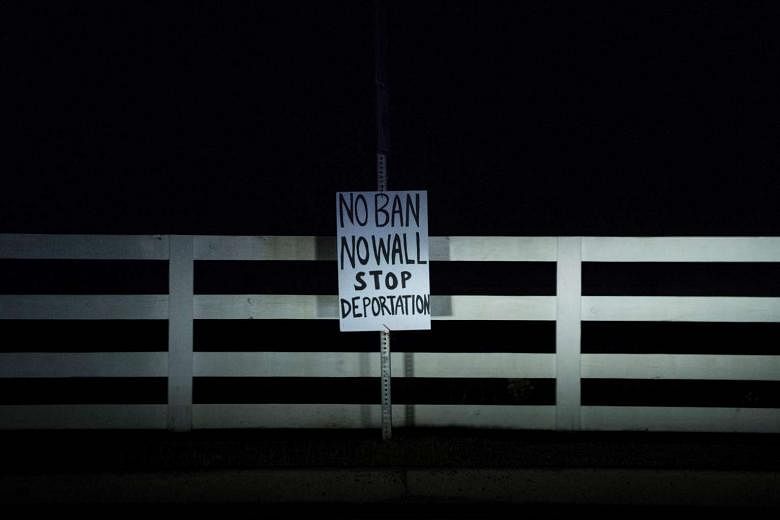RICHMOND, Virginia (REUTERS) - US President Donald Trump's administration on Monday (May 8) told a federal appeals court in Virginia his temporary ban on travellers from six Muslim-majority countries was inspired by national security concerns, not religious discrimination, as it sought to convince the judges to revive the policy.
The Richmond-based 4th US Circuit Court of Appeals began an hour-long hearing of arguments in the administration's appeal of a March 15 ruling by Maryland-based federal judge Theodore Chuang putting the travel ban on hold a day before it was due to go into effect.
It marked the latest legal test for the Republican president's travel ban, which also was blocked by federal judge Derrick Watson in Hawaii in a separate legal challenge. An earlier version of the ban was also blocked by the courts.
Chuang blocked part of Trump's March 6 executive order that prohibited new visas to enter the United States for citizens of Iran, Libya, Somalia, Sudan, Syria and Yemen for three months. Watson in Hawaii also blocked another part of the order that suspended the entry of all refugees into the United States for four months.
"This is not a Muslim ban," acting US Solicitor General Jeffrey Wall, arguing on behalf of Trump, told the judges.
Wall said the temporary ban was intended to give the government time to evaluate whether people from the six countries were being subjected to adequate vetting to ensure they did not pose a security threat to the United States.
The 4th Circuit judges asked Wall what had been done by the administration since Trump signed his two travel ban orders to improve vetting procedures, given that the 90 days the administration said it needed for a review after the order was first signed in January had passed.
Wall told the court "we have put our pens down", because of the rulings from the courts that blocked the orders. He said that while some work has been done more generally, "since March 16, we have done nothing to review the vetting procedures for these countries", Wall said. He said the aim of the 90-day window was to free up the government to do the review, but instead manpower has been devoted to litigating the cases brought against the ban.
Chuang's ruling came in a lawsuit challenging the revised travel ban brought by refugee organisations and individuals who said they would be harmed by the policy.
The challengers said Trump's order violated federal immigration law and a section of the US Constitution's First Amendment barring the government from favouring or disfavouring a particular religion.
Wall argued that the second order was changed significantly from the first to address some of the legal problems.
Judge James Wynn Jr. questioned if Trump's comments could be looked at to determine the ban's intent.
"Which are the statements are relevant here?" Wynn asked in reference to some of Trump's comments. He seemed to refer to Trump's remarks after the issuance of the second ban order that it was just a "watered down" version of the first.
"There was sort of a wink and a nod, of 'Well you know what I mean,' even though it's changed," Wynn said.
Chuang wrote in his ruling that Trump's own past comments such as calling for "a total and complete shutdown of Muslims entering the United States" provided a convincing case that the motivation for the order was putting in place the president's"long-envisioned Muslim ban".
Trump's Justice Department contends the motivation for the travel ban was to protect the United States from terrorism. Administration lawyers said courts should not base their rulings on Trump's comments during the 2016 election campaign because those statements were made before he became president.
Regardless of how the 13 judges of the 4th Circuit rule, the matter is likely to be decided ultimately by the US Supreme Court.
The full 4th Circuit took up the appeal but two Republican-appointed judges did not participate. That left nine judges appointed by Democratic presidents, three Republican appointees and one judge originally appointed by a Democrat and later re-appointed by a Republican.
No ruling was expected on Monday and it was unclear when the court would rule.
Trump issued the March executive order after federal courts blocked an earlier version, issued on Jan. 27 a week after he took office, that also had included Iraq among the nations targeted. That order, which went into effect immediately, triggered chaos and protests at airports and in several cities before being put on hold due to legal challenges.
The second order was intended to overcome the legal problems posed by the original ban.
Protesters critical of the travel ban gathered outside the courthouse under sunny skies, holding signs saying "Immigrants and refugees enrich America" and "No ban, no wall, no white supremacy."
"You can't be told you can't come into the country because of your religious beliefs," said protester Jennifer Larson from Norfolk, Virginia. "No culture, or class or religion should be discriminated against."
The administration's appeal in the Hawaii case will be heard in Seattle on May 15 by a three-judge panel of the San Francisco-based 9th US Circuit Court of Appeals.
The three judges assigned all are Democratic appointees.

